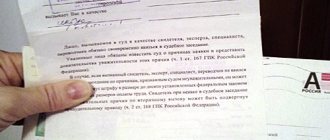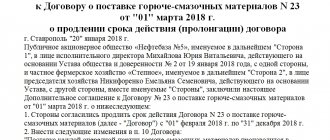The Supreme Court indicated when a party to a lawsuit is not considered notified of it
The Supreme Court issued Determination No. 305-ES19-14303, in which it indicated that the return of a court notice without a postal office mark about the reasons for the return does not confirm the notification of the party about the start of legal proceedings.
In October 2021, JSC Administrative Directorate of the Ministry of Culture of Russia filed a claim with the Moscow Arbitration Court against JSC Historical and Architectural Complex Nikolskoye-Uryupino for the recovery of more than 223 million rubles. debts under a land lease agreement. Already on December 24, 2021, the claim was satisfied, while representatives of the defendant did not participate in the meeting.
On February 11, 2021, the company appealed to the Ninth Arbitration Court of Appeal with an appeal and a petition to restore the missed deadline for filing it, which expired on January 25. The complaint, in particular, noted that the defendant was not notified of the lawsuit.
The Court of Appeal, guided by Art. 54, 165.1 Civil Code, parts 4 and 6 of Art. 121, part 1 art. 259 of the Arbitration Procedure Code, clarifications of paragraph 17 of the Resolution of the Plenum of the Supreme Arbitration Court of May 28, 2009 No. 36 “On the application of the Arbitration Procedural Code of the Russian Federation when considering cases in the Arbitration Court of Appeal”, terminated the proceedings on the complaint due to the refusal to satisfy the request for restoration of the missed deadline for its submission. The appeal noted that the full reasoned text of the decision of the trial court was prepared on December 24, 2021 and posted on the information portal “Card Index of Arbitration Cases” on December 25, 2021. “In accordance with Part 6 of Art. 121 of the Arbitration Procedure Code of the Russian Federation, the applicant was independently obliged to take measures to obtain information about the judicial act,” the court indicated.
The appellate court also noted that, according to the case materials, the defendant was notified of the acceptance of the statement of claim for proceedings and of the appointment of the case for trial, since the judicial notice was sent in accordance with Part 4 of Art. 121 of the APC at the location of the legal entity. Thus, the defendant bears the risk of adverse consequences as a result of failure to take measures to obtain information about the progress of the case. The Arbitration Court of the Moscow District left the determination of the appeal unchanged.
Disagreeing with the ruling of the cassation court, the company appealed to the Supreme Court.
Having studied the materials of case No. A40-238644/2018, the Judicial Collegium for Economic Disputes of the Armed Forces of the Russian Federation noted that, in accordance with paragraph. 2 hours 1 tbsp. 121 of the Arbitration Procedure Code, information on the acceptance of a statement of claim or statement for proceedings, on the time and place of the court hearing is posted by the arbitration court on the official website of the arbitration court on the Internet no later than 15 days before the start of the court hearing or the commission of a separate procedural action, unless otherwise provided by this Code . Documents confirming that the arbitration court posted the specified information on the official website of the arbitration court on the Internet, including the date of its publication, are attached to the case materials.
Who won't come to court
Christ, giving the promise that he who hears His word and believes in Him who sent Him will inherit eternal life, ends with another promise: such a person “does not come into judgment,” but passes “from death to life” (John 5:24).
What does this mean? The Apostle Paul in his letters describes two different ways of life that lead to different consequences in eternity. “He who sows to his flesh will from the flesh reap corruption, but he who sows to the Spirit will from the Spirit reap eternal life” (Gal. 6:8). These words echo what Christ said: “Where your treasure is, there your heart will be also” (Matthew 6:21). If a person spends the time of earthly life to acquire earthly goods, i.e., entertainment, receiving carnal pleasures, accumulating wealth, achieving fame, then he will reap corruption, because earthly life will end sooner or later. All his efforts that were spent to achieve earthly goals will remain here and will not be in demand there. We will not take them with us into eternity. We won’t take away our dachas, cars, bank accounts, our position in society won’t even help, there won’t be any job privileges - everything will remain here. Remember the crazy rich man from Christ's parable. What is his fate? But in his earthly life he enjoyed wealth and honor, his every whim was fulfilled.
But a person who “sows to the Spirit,” that is, who performs works of faith and love, who has adorned his soul with patience, unites with God here, in earthly life. Such a person does not come to judgment because he has achieved unity with God already here on earth. There is no point in meeting God at the Judgment if he is already with Him. The court will be universal, for all people, but it should not be understood in the image of an earthly court, where there are speeches, hearings, sessions, prosecutors, lawyers, judges go to conference... The Heavenly Court is not like that, it will happen instantly, and we still need to prepare for it In this life.
Let's give an analogy. A number of university teachers have such a system. Those students who attended classes studied well, were active in their studies throughout the semester, came to the test like everyone else, but did not pass it, but immediately received a good grade from the teacher “automatically” in their record book. Why? Because he and the teacher worked closely all this time, and it was already clear to him that these students knew the material. And those who skipped classes, avoided laboratory work, of course, sat, prepared and passed the test without fail. The teacher knows who was active during the school year, and he passed the test easily. Whoever meets him for the first time at the test session will be judged.
And finally, in the same context, the Lord speaks of another interesting promise: man will “pass from death to life.” What is death? Spiritual death is the alienation of man from God, and life is unity with Him. If a person has already united with God in his earthly life, then he has already passed from death to life, and physical death is no longer scary for him, since he was with God on earth, so he will remain with God after death, in eternity.
We are all born alienated from God and begin to overcome this alienation in the sacrament of Baptism. Even if a child is born from baptized, church-going parents, he is still born in alienation from God. He must be baptized, because it is not the physical nature of a person (the body) that is baptized, but his hypostasis. We borrow only physical nature from our parents, and each person has their own hypostasis. For example, when a pregnant woman is baptized and expecting a child, only she is baptized. The child, although he is inside her, when born, is considered unbaptized. After birth he must be baptized.
If a person in his earthly life actualizes his Baptism, that is, tries to live by faith, then through this he will overcome his alienation from God. In his life he will learn to be with God, to act according to His commandments. And then, after completing his earthly life, the Lord accepts him into His palace - the Kingdom of Heaven. And if anyone in the days of earthly life was alien to this process, then he, like the five foolish virgins, will hear other words: “Truly I say to you, I do not know you” (Matthew 25:12).
The Lord calls each of us to follow the path of life in order to gain eternity. And it depends on us which path of life we choose. Even in the Old Testament, through the prophet Moses, the Lord said: “I have set before you life and death... Choose life, so that you and your descendants may live, love the Lord your God, listen to His voice and cleave to Him; for this is your life and the length of your days” (Deut. 30:19–20).
Consideration of the case in the absence of the defendant
A request for proceedings without the participation of the defendant is considered by the court at a hearing. The court, having considered such a petition, determines the possibility of considering the case in the absence of any of the parties.
When preparing for a case in accordance with Art. 150 of the Code of Civil Procedure of the Russian Federation, the judge performs all necessary procedural actions. Then, at the appointed time, the case itself is considered. At the same time, the court indicates at the very beginning of the process that the defendant has received a request to consider the case without him and finds out whether the others object to the proceedings in his absence.
If the appearing party does not object, the hearing continues without the defendant in the usual manner. The position of the defendant is clarified from the objections and other documents submitted by him.
Algorithm of legal proceedings:
- The hearing begins in the standard format.
- It is revealed which of the participants cannot visit the courthouse and whether there is a corresponding petition from him in the case materials. At the same time, it is determined whether authorized representatives of such persons are present.
- Next, legal proceedings proceed as usual. The necessary procedures are being carried out. This trial differs only in the absence of any of the participants.
- The court makes the necessary decision.
If the defendant, who was notified of the date and place of the hearing, fails to appear at the court hearing, does not report the objective reasons for the absence and does not ask for legal proceedings without him, the case will be considered in absentia. This is provided for in Art. 233 Code of Civil Procedure of the Russian Federation. The court issues a ruling on consideration of the case in absentia proceedings.
In this case, the final word on the type of proceedings (regular or absentee) remains with the court. Participants in the process who did not appear at the court hearing are sent copies of the court decision by mail.
Petition with a representative
The presence of a representative on a party does not neutralize its obligation to notify about the reasons for its absence in the courtroom, including when the representative directly participates in the proceedings.
Typically, the judicial authority expects that a request for an absentee hearing will be drafted by the party himself. However, if there is a power of attorney with the right to sign and submit procedural acts, the document in question can be drawn up, signed and submitted by a representative.
In the absence of a participant and the appearance of only a representative, negative consequences are possible, such as: conducting proceedings in absentia.
A representative of a company or government agency has the right to request consideration of the case in his absence. Typically, such requests do not encounter any obstacles.
Consequences of the defendant's failure to appear in court
Procedurally, the law does not stipulate a person’s obligation to directly participate in the judicial process. If he has significant reasons not to visit the courthouse, then he is obliged to notify the judge about this in writing.
The presence of all parties to the dispute allows us to study the situation from different angles and make a full and fair decision. The absence of participants in legal proceedings in certain cases allows the judge:
- reschedule the meeting for another day;
- implement the process without any of the participants.
A judgment without a defendant is quite acceptable. The legal consequences of the defendant’s absence in the courthouse are determined by Article 167 of the Code of Civil Procedure of the Russian Federation. In this connection, it is recommended to leave only minor categories of cases without your participation. Otherwise, you must apply to postpone the hearing or send an authorized representative in your place.
Features of cancellation of in-person and absentee decisions
By law, court decisions are divided into in-person and absentee. The in-person decision is made in the presence of all parties and can be appealed within 1 month by filing an appeal to a higher court. Example: if the decision was made by a city or district court, then the complaint must be filed in the regional or regional court. If the global one is wrong, you need to go to the district or city.
A decision in absentia is made by the court if the defendant is absent from the hearing. In this case, according to Article 237 of the Civil Procedure Code (CPC), the defendant has the right to file an application with the court to cancel the decision within 7 days.
The application is submitted to the court that heard the case. After this, a meeting is held to discuss the possibility of overturning the decision. If the court refuses to satisfy the application, then within 1 month both the in-person and absentee decisions can be appealed (cancelled in whole or in part) by way of appeal.
Appeal to the cassation court to cancel the decision
If the appeal did not help and the decision entered into legal force, then you can try to overturn it in the court of cassation. The complaint must be filed within 6 months from the date of entry into force of the resolution.
It is worth filing a complaint with the cassation only if all available resources have been exhausted. If the decision has entered into legal force, and the deadline for an appeal has expired, then it will no longer be possible to change anything.
Winning a case here is even more difficult. The grounds for review can only be significant violations, without eliminating which it is impossible to restore and protect the violated rights.
Sources:
Contents of the appeal (Article 322 of the Code of Civil Procedure)
Grounds for reversing a court decision on appeal (Article 330 of the Code of Civil Procedure)
Procedure and deadlines for filing an appeal (Article 321 of the Code of Civil Procedure)
Contents of the appeal
To increase the chance of overturning a court order, it is important to draft a complaint correctly. It includes:
- the name of the court to which the complaint is being filed;
- Full name of the person filing the complaint, his place of residence;
- the court decision that is being appealed;
- the person’s demands (to cancel or change the resolution);
- the reasons why the decision was considered unfair;
- list of documents attached to the complaint.
Important. The resolution that the appeals court makes will take effect immediately.
Grounds for reversing a court decision
A court ruling can be canceled on the grounds specified in Article 330 of the Code of Civil Procedure. These include: incorrect determination of the circumstances of the case, inconsistency of the court’s conclusions with the circumstances of the case under consideration, lack of proof of the circumstances.
In any case, the decision must be annulled if:
- the case was considered by the court in an illegal composition;
- there was no minutes of the meeting;
- the case was considered in the absence of the main participants (due to the fact that they were not notified), etc.
Due to frivolous and formal violations, the previous court decision will not be canceled. We need good reasons.








